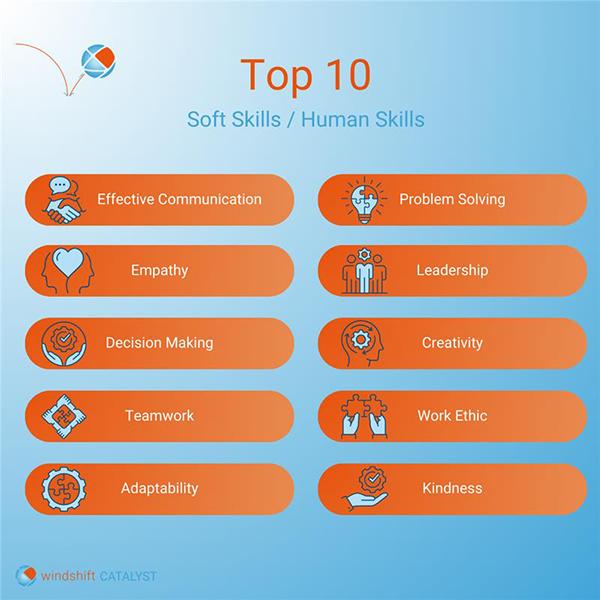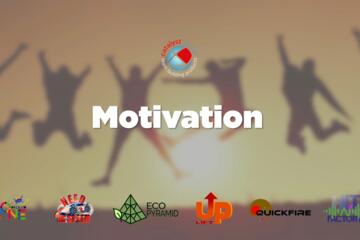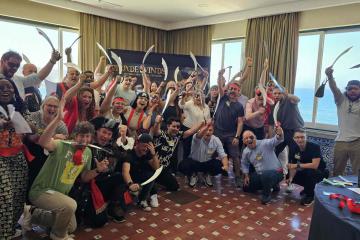What are Soft Skills?
Soft skills are personal and interpersonal skills that determine how to navigate social and professional environments successfully. Unlike hard skills, which include measurable technical knowledge such as programming or project management, soft skills revolve around communication, collaboration, adaptability, and leadership. These skills help individuals collaborate effectively, resolve conflicts, and build strong relationships. While hard skills are the foundation for a technical role, soft skills often enable a positive and productive work environment.
Soft skills play a crucial role in daily workplace functioning. They enable employees to communicate ideas, listen actively, and respond to the needs of others. Whether responding to unexpected situations or building team trust, soft skills are the 'silent forces' that ensure balance and growth within teams and organizations.
Soft Skills Versus Hard Skills – A Balance of Success
Hard and soft skills complement each other and form a balanced skills profile. Hard skills are professional knowledge and measurable competencies often demonstrated with diplomas or certificates, such as IT skills, financial expertise, or technical research. They are important for performing specific tasks and give professionals access to their roles.
Soft skills, on the other hand, go beyond a job's technical demands and are the invisible connection between knowledge and effective execution. Think adaptability, creative problem-solving, and critical thinking. While technical knowledge can lay the foundation, the ability to act flexibly and empathetically often makes all the difference in how successful someone is in their role. By investing in developing soft skills, employees can improve their immediate job performance and contribute to a positive work environment where collaboration and innovation are key.
The Importance of Soft Skills in a Dynamic Work Environment
In recent years, the role of soft skills has increased significantly. Where an authoritarian and number-oriented leadership style used to be the norm, we are now shifting to a style based on emotional intelligence, compassion and trust. This transition is particularly visible in knowledge-intensive sectors, where creative thinking and problem-solving are crucial.
Soft skills such as empathy, adaptability, and effective communication contribute to a work environment where employees feel included and valued. Employees who feel heard perform better and actively contribute to the company culture. In addition, soft skills are essential in constant change and uncertainty, as they help to respond flexibly to new challenges. Organizations that prioritize soft skills foster a positive culture and enable teams to adapt to market changes and proactively capitalize on opportunities quickly.
In short, soft skills are no longer just 'nice-to-have' traits but are seen as indispensable drivers of business success. Organizations that invest these skills in their employees build a resilient, engaged, and forward-looking culture that sets them apart in a competitive market.

What are the top 10 most important soft skills?
Soft skills are essential in the modern work environment. They are at the heart of effective collaboration, empathy, and the ability to respond to change. These skills strengthen the individual, the team, and the organization. Below, the ten most important soft skills that help employees excel in various professional situations are discussed.
1. Effective Communication
Effective communication is a crucial soft skill that lays the foundation for successful collaboration and good team dynamics. By communicating clearly and concisely, you can ensure that messages come across clearly and misunderstandings are avoided. This ability includes speaking and listening and is important in building relationships with colleagues, clients, and supervisors.
Improving communication skills allows for better collaboration and greater understanding in the workplace. Active listening, recognizing nonverbal cues, and giving and receiving feedback are important elements of effective communication. These skills contribute to resolving conflicts and fostering mutual respect within a team.
2. Empathy
Empathy allows individuals to empathize with the emotions and viewpoints of others, leading to a more cohesive and supportive work environment. An empathetic attitude helps to reduce tensions and create an atmosphere of understanding and cooperation. It makes communication friendlier and creates better relationships between team members and supervisors.
In a business context, empathy helps better understand customers and colleagues, increasing trust and loyalty. Empathy encourages open communication, increases engagement, and fosters a company culture where employees feel valued. This skill is essential for leaders who want to create a safe, inclusive environment.
3. Effective Decision-Making
Effective decision-making is a valuable soft skill that helps individuals choose the best options in various situations. This process involves gathering information, evaluating various options, and making informed decisions. Good decision-making uses critical thinking and strategic insight, which contributes to achieving organizational and team goals.
For teams and businesses, effective decision-making is crucial to quickly addressing challenges, minimizing risk, and capitalizing on opportunities. It prevents stagnation and ensures clear guidelines and progress. Making decisions with a well-thought-out approach leads to better results and a more efficient working method.
4. Collaboration and Teamwork
Teamwork is the ability to work well with others and pursue common goals. It includes communication, collaboration, and shared responsibility. A good team spirit increases productivity and contributes to a positive work culture. Encouraging collaboration helps teams share creative ideas and come up with innovative solutions.
In professional settings, effective teamwork encourages job satisfaction and fosters mutual respect. People who work well together deliver more value to their organization by contributing to better team dynamics and achieving results that are more difficult to achieve individually.
5. Adaptability
Adaptability is the ability to deal flexibly with changes and new circumstances. People with adaptability remain calm and productive, even in unexpected situations. They can switch quickly and will revise their working methods to remain as effective as possible.
This skill is invaluable in an ever-changing work environment, where technological developments and market needs constantly change. Adaptable employees contribute to the success of their organization by being flexible in responding to new challenges and opportunities.
6. Problem-Solving Skills
Problem-solving skills enable employees to analyze complex situations, identify problems, and develop effective solutions. It's about using critical and creative thinking to develop workable solutions. This skill helps individuals to tackle challenges in a structured and goal-oriented way.
Organisations benefit from problem-solving employees because they can effectively overcome obstacles and improve processes. Strong problem-solving skills prevent small problems from becoming big challenges, contributing to a resilient and agile company culture.
7. Leadership
Leadership is the ability to inspire and guide a group in achieving common goals. Good leaders develop a vision, take responsibility and support team members' growth. Leadership requires communication skills and the ability to motivate and support others in their performance.
A good leader provides direction and focus in a team or organization, leading to faster and more efficient results. Strong leadership fosters a positive work culture and increases the productivity and motivation of team members, contributing to success in a competitive market.
8. Creativity
Creativity is the ability to think outside the box and devise innovative solutions. In a work environment, creativity means that employees bring in original ideas that help the organization innovate products, services, and processes. This skill fosters a culture of continuous improvement.
Creative solutions are important because they help businesses differentiate themselves in a competitive market and capitalise on new opportunities. Creativity also increases employee motivation and engagement, as they feel free to contribute new ideas and contribute to the organisation's success.
9. Work Ethic or Work Attitude
A positive work attitude includes motivation, proactivity and flexibility. Employees with a strong work ethic are focused on achieving results and contributing to a productive and pleasant work environment. This skill helps to tackle challenges with an open and constructive attitude.
Work ethics are important because they contribute to overall efficiency and collaboration within a team. Employees with a strong work attitude positively influence the work environment, resulting in better performance and higher job satisfaction. Companies with a culture of engaged and hard-working employees tend to perform better.
10. Kindness
Kindness is being kind and respectful with colleagues, supervisors, and customers. It fosters a supportive work environment where people feel valued and understood. Friendly communication reduces stress and conflict and contributes to a positive team dynamic.
A culture of kindness fosters engagement and loyalty within a team.
Employees who feel supported are willing to go the extra mile and help each other. This leads to better performance, customer satisfaction and long-term partnerships inside and outside the organization.
Conclusion Top 10 soft skills
Soft skills are the backbone of success in modern work culture. They are important to individuals and essential to an organization's overall success. Where technical knowledge and skills lay the foundation, soft skills ensure effective communication, constructive collaboration, and a strong company culture. Employees with well-developed soft skills can flexibly adapt to change, make informed decisions, and build strong relationships that strengthen team productivity and innovation.
Soft skills help organizations stay competitive in a dynamic and ever-changing marketplace. By investing in developing these human skills, companies develop resilient and engaged teams and a work environment that encourages creativity and growth. In conclusion, soft skills make the difference between high-performing and excellent organizations and are essential for those who want to remain sustainable and successful in an increasingly complex world.
How can you practice and support Soft Skills as an organization?
Here are five ways organizations can support their employees in developing soft skills:
1. Creating a feedback culture
Foster a culture where giving and receiving feedback is the norm. Employees gain insight into their communication style, collaboration, and other soft skills by organising regular and constructive feedback moments. Feedback sessions can be given by both colleagues and supervisors, allowing employees to better understand and develop their behaviour and interaction patterns in a more targeted way.
2. Workshops and Training for Active Listening
Organize trainings and workshops that focus on active listening and communication skills. In these sessions, employees learn to listen attentively and ask relevant questions without interrupting. By practising active listening, the team strengthens effective communication and creates a culture of mutual respect and understanding.
3. Mentorship and Coaching Programs
Develop mentorship and coaching programs where employees can learn from experienced peers and supervisors. Employees can strengthen their leadership, empathy, and teamwork skills by assigning mentors and coaches. This provides a valuable opportunity to develop soft skills in a supportive and personal context.
4. Build in Mindfulness and Reflection Moments
Encourage mindfulness and regular self-reflection by, for example, organizing weekly reflection moments or mindfulness sessions. These activities help employees become more aware of their emotions and reactions in work situations. Increased awareness contributes to developing emotional intelligence and resilience, allowing employees to cope better with stress and challenges.
5. Simulations and Role Plays in Team Building
Organizing simulations and role-plays effectively allows employees to practice soft skills such as problem-solving, decision-making, and conflict management. Team-building programs with a good debrief or feedback session provide a safe and playful environment ideal for practising soft skills.
Highly recommended books on soft skills:
"How to Win Friends and Influence People" - Dale Carnegie (1936)
- This classic book is about building relationships and effective communication, essential for developing strong interpersonal skills.
"Emotional Intelligence" - Daniel Goleman (1995)
- Goleman introduces the concept of emotional intelligence, where self-awareness, empathy, and social skills are central to personal and professional success.
"Crucial Conversations: Tools for Talking When Stakes Are High" - Kerry Patterson, Joseph Grenny, Ron McMillan, and Al Switzler (2002)
- This book provides techniques for improving communication in stressful situations, which helps with conflict management and team decision-making.
"The 7 Qualities of Effective Leadership" – Stephen R. Covey (1989)
- Covey's book focuses on personal development and leadership, with skills such as empathy, collaboration, and self-reflection playing a key role.
"The Power of Now" - Eckhart Tolle (1997)
- Tolle's focus on mindfulness and self-awareness helps readers develop emotional intelligence and stress resilience, which are important soft skills for any workplace.
"Think Again: The Power of Knowing What You Don't Know" - Adam Grant (2021)
- Grant encourages developing a flexible mindset, which fosters adaptability and critical thinking, which are important skills in a dynamic work environment.
"Dare to Lead: Brave Work. Tough Conversations. Whole Hearts." – Brené Brown (2018)
- Brown explores the importance of vulnerability and empathy within leadership and offers tools for developing emotional intelligence and authentic communication.
"Leaders Eat Last: Why Some Teams Pull Together and Others Don't" - Simon Sinek (2014)
- Sinek discusses the importance of trust, empathy, and a caring leadership style, which promote a safe and connected work environment.





